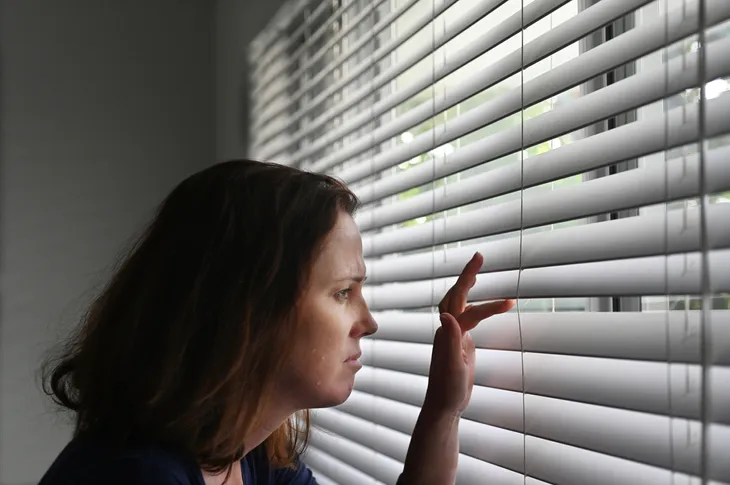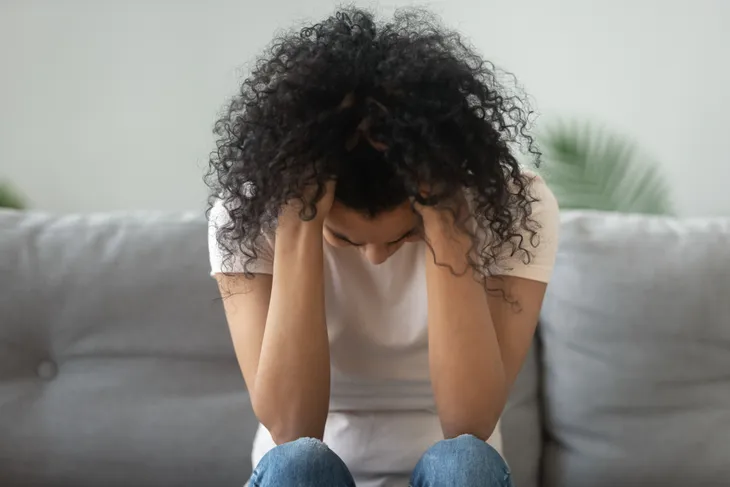- Paranoia can be a symptom of a mental health disorder, however, it isn’t a diagnosis itself.
- A delusional disorder (previously known as paranoid disorder) is a serious type of mental illness.
- While the two may share similar characteristics they are different.
Have you ever felt like someone was talking behind your back, even though you didn’t have proof? Perhaps you’ve felt like someone was trying to steal your possessions or harm you. You might be suffering from paranoid or delusional thoughts. However, paranoia and delusional disorders are different.
Paranoia can be a symptom of a mental health problem, but it’s not a diagnosis in itself. Delusional disorder, on the other hand, is a type of serious mental health illness. But there’s a lot more to know about the two. Let’s take a look at what paranoia and delusional disorders are and how they differ!
What Is Paranoia?
According to Mental Health Americans, (MHA) paranoia “involves intense anxious or fearful feelings and thoughts often related to persecution, threat, or conspiracy.” Paranoid thoughts are also sometimes called delusions.
Many of us have felt paranoid at some time or other, but how can you tell the difference between a suspicious thought and a paranoid one? For starters, if no one else shares the same suspicious thought, you may be paranoid. If there’s no definitive evidence that confirms the thought, or if there is evidence against the thought, it may also be paranoia. Finally, you may be paranoid if you still have the thoughts even though you have reassurance from others.
Is Paranoia a Mental Health Disorder?
Paranoia can be a symptom of a mental health disorder, however, it isn’t a diagnosis itself, explains Mind.org. Paranoid thoughts can range for each individual from mild to very severe. Mild paranoia (typically called non-clinical paranoia) is the most common and means you may realize over time that the paranoid thought isn’t justifiable, or if you simply stop having those particular thoughts.
On the other hand, when you have severe paranoid thoughts, (also called clinical paranoia or persecutory delusions), your paranoia will be more severe and you’ll likely need treatment. Paranoia can also be a symptom of serious mental health illnesses such as paranoid schizophrenia, paranoid personality disorder, and delusional disorder, explains the source.
What Is a Delusional Disorder?
A delusional disorder (previously known as paranoid disorder) is a serious type of mental illness, explains the Cleveland Clinic. Individuals with this mental illness have a hard time telling the difference between what is real and what is imagined. The main symptom of this disorder is delusions “which are unshakable beliefs in something untrue,” explains the source.
Unlike some other mental illnesses, individuals with delusional disorders can often function normally, including normal socialization. That said, some individuals may also become so consumed with their delusions that their lives are disrupted.
Types of Delusional Disorders
A delusional disorder can be further categorized into different types based on the main theme of the delusions. WebMD says the six types of delusional disorders are:
- Grandiose: The individual has an exaggerated sense of power, worth, knowledge, or identity (for example, they may think they have an amazing talent).
- Erotomanic: The individual believes someone is in love with them (usually someone famous or important). This can lead to stalking behavior.
- Persecutory: The individual believes someone is planning to harm them or is spying on them. They may even complain to legal authorities repeatedly.
- Jealous: The individual believes their partner is unfaithful.
- Somatic: The individual believes they have a medical problem or physical defect.
- Mixed: The individual has two or more types of delusional disorder.
Signs and Symptoms of Paranoia
The symptoms of paranoia can vary for each individual, however, common signs to be on the lookout for include defensive, hostile, and aggressive behaviors. The individual may also be easily offended, and may always think they’re right.
Paranoid individuals also have difficulty relaxing, comprising, forgiving, and accepting criticism. They may also have trouble trusting or confiding in other people. Finally, they may also read hidden meanings in people’s normal behaviors, explains WebMD.
Signs and Symptoms of Delusional Disorders
An individual with delusional disorder can experience non-bizarre delusions, “which involve situations that could occur in real life, such as being followed, poisoned, deceived, conspired against, or loved from a distance,” explains the Cleveland Clinic. However, the reality is the situations are either not true or are highly exaggerated.
Non-bizarre delusions are the most common (and obvious) sign of delusional disorder, however, there are other signs to be on the lookout for too. The individual may have a low mood, be angry, or be irritable. They may also experience hallucinations (seeing, hearing, or feeling things that aren’t really there) that are related to their delusion.
What Causes Paranoia?
The exact cause of paranoia isn’t quite known, however, the symptoms may be related to repressed, denied, or projected feelings. It may also be related to events or relationships in the individual’s life.
WebMD, says certain factors may also lead to paranoid thoughts, such as not getting enough sleep. Lack of sleep can take a toll on your ability to think clearly, and in some cases, a severe lack of sleep may lead to hallucinations. The source also says stress may play a role too. So, do your best to get good quality sleep every night, and practice stress management strategies such as exercising, meditating, and stretching. Reach out to a health professional if self-management strategies don’t work for you.
Disorders That Cause Paranoia
Paranoid thoughts can also be caused by other disorders, such as paranoid personality disorder. This disorder can make it difficult to trust others and cause an array of negative thoughts. Borderline personality disorder may also cause paranoid thoughts.
Schizophrenia is another serious disorder that can cause paranoia. This disorder can “make it hard to tell what’s real and what’s imagined,” explains WebMD. In most cases, you can’t differentiate when your thoughts become paranoid, and instead, your doctor or a loved one will have to point it out to you.
Paranoid Thoughts Doesn’t Always Mean You Have a Disorder
Keep in mind, occasional paranoia or worrying about what others think about you doesn’t necessarily mean you have a psychiatric disorder. In fact, if you can acknowledge that these thoughts are irrational or don’t make sense, this could be a good sign that you have good mental health.
On the other hand, if the paranoia starts interfering with your everyday life, that’s when it becomes a problem. If this is the case, it’s time to see your doctor or mental health professional.
What Causes Delusional Disorders?
Like paranoia and other psychotic disorders, the exact cause of delusional disorder isn’t quite understood. However, WebMD says researchers are investigating certain factors that may increase your risk of developing it.
For starters, it may be linked to genetics. Individuals with a family history of delusional disorder or schizophrenia may be at an increased risk. Biological factors, such as abnormal brain regions may also lead to delusional symptoms.
Finally, environmental and psychological factors may also increase one’s risk. For example, the source says some evidence suggests that stress can trigger the disorder. Isolated individuals (such as immigrants, or those with poor hearing or sight) may also be at an increased risk.
Diagnosing Delusional Disorders
If you or a loved one is showing signs of delusional disorder, see a doctor. To diagnose the disorder, the doctor will likely start by reviewing the medical history and performing a physical exam. While there is no single test to confirm a diagnosis, your doctor may request a variety of tests (such as blood tests or X-rays) to rule out other illnesses.
If there are no signs of other illnesses, your doctor will likely refer you to a psychologist or psychiatrist, which are specialists who diagnose and treat mental illness. These health professionals typically perform a special interview and use assessment tools to evaluate an individual. The Cleveland Clinic explains, “a diagnosis of delusional disorder is made if a person has non-bizarre delusions for at least one month and does not have the characteristic symptoms of other psychotic disorders, such as schizophrenia.”
Treating Paranoia
The best way to treat paranoia is to talk to a doctor or mental health professional. They can help you identify the problem and create a treatment plan. That said, WebMD points out that since you can still recognize that your paranoid thoughts aren’t reasonable, there may be some things you can do at home to help.
The source says, eating a healthy, balanced diet, exercising regularly, and getting plenty of good quality sleep are all crucial steps in achieving mental balance. In turn, this may help keep your paranoid thoughts away. Additionally, it may also be helpful to talk to yourself about your paranoid thoughts. The source says saying things like “I’m worried about something that’s highly unlikely to be true,” can be helpful.
If your paranoia is interfering with your daily life, a mental health professional can help. They may recommend talk therapy or may prescribe medication to help improve your symptoms.
Treating Delusional Disorders
Psychotherapy is the most common, and primary treatment for delusional disorders. Therapy can help the individual learn how to control their symptoms. It can also help them identify early warning signs of relapse and create a relapse prevention plan, says the Cleveland Clinic.
Some examples of psychotherapy include:
- Cognitive-behavioral therapy (CBT) is a common type of talk therapy that helps the patient recognize and change thought patterns.
- Individual psychotherapy can help the patient recognize and correct thoughts that become distorted.
- Family therapy can help family members of the loved one who has the delusional disorder. It can help the family members learn more about the disorder and how they can support their loved ones at home.
Finally, in some cases, antipsychotic medication may also be a part of the treatment plan.
















